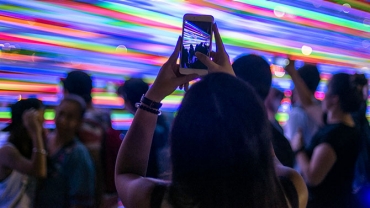
Companies that invest in esports now will profit from growth
17/12/19
PwC Sports Survey 2019
The PwC Sports Survey 2019 ranked esports number 1 in terms of sports with the highest revenue growth potential, ahead of soccer and basketball, for the second year running. Companies are taking more and more interest in video game competitions, professional gamers and their teams. How does sponsorship of esports compare to that of traditional sports? Marjolein Buiter (PwC) discussed the subject with Maurice Eisenmann. He is Vice President Business Development at Dignitas, an American professional esports organisation with teams in various games, including League of Legends and CS:GO.

Who is Maurice Eisenmann?
Maurice Eisenmann has been operating in the world of esports in a professional capacity for five years, working as a gaming consultant for, among others, Prodigy Sports and soccer club Bayern Munich. He is not surprised by the great potential for revenue growth in esports, although he does make one observation: "Esports is a catch all name for all individual titles, like League of Legends, Dota and CS:GO. Identifying the potential for individual titles would provide a more 'apples-to-apples' comparison with individual sports like soccer. But the growth opportunities are still huge, certainly when you compare Europe and North America to China or South Korea, where esports is more mainstream and already generates higher revenues."
What can traditional sports learn from esports?
"What makes esports unique is the direct engagement of fans with the players. It is not from a distance in a stadium once a week, but throughout the whole week, online from home or on your smartphone. Traditional sports can only dream of that kind of well-rounded content calendar. The content offerings are also much more interactive. Imagine a football fan being able to watch a training session or match through the eyes of Cristiano Ronaldo. You can do that in esports. Take someone like Huni, a top player of League of Legends, who streams on Twitch and gives fans a glimpse into his day-to-day practice. That’s a level of engagement that’s unheard of in traditional sports."
What can esports take away from traditional sports?
"There is a lot that we can learn. First and foremost, monetization. Don’t pin me down on the exact numbers, it varies considerably per research report, but the average esports fan spends around four to seven dollars per year, while fans of traditional sports spend thirty to fifty dollars. The second thing that traditional sports are good at is building a local fan base. The physical location of a club provides a natural influx of fans. For local esports teams, which do exist, it is more difficult to build a local following because the game is played online and a local esports culture has yet to be established."
What about the exchange of experiences between organisations in esports and traditional sports?
"The dialogue has increased significantly in the last few years. Dignitas, the company I work for, was acquired by Harris Blitzer Sports & Entertainment – a company that also owns, among others, teams in the NBA (basketball league) and the NHL (ice hockey league) in the USA – close to three years ago. Since then a lot of the investment in esports has come from the traditional world of sports. And there are more examples of that. The potential of esports has resulted in interest from companies in the corresponding traditional sector. The exchange of knowledge and experience will further stimulate the growth of esports."
In your opinion is there crossover potential of gamers becoming sports fan and vice versa?
"Absolutely, look at Major League Soccer, the American soccer league, for example. One of the reasons MLS created eMLS, which is their esports league, was to cultivate new fans for traditional soccer from that very large group of gamers. Particularly in areas in the USA where soccer is not as popular, you see fans experiencing the sport for the first time through FIFA. Another example is the NBA that created the NBA2K (basketball simulation) league. This allows them to bring in new fans, engage existing basketball fans all over the world and offer content, even when the basketball season is over. The dream of every sports property is to have a 365 day calendar of content and esports is able to fill up some of the gaps."
Sponsorship and advertising are important sources of income for esports. Why are companies making these investments?
"Sponsoring esports can be a valuable addition when trying to reach certain audiences. The esports audience can generally only be reached via esports because over eighty percent uses ad blockers to remove online advertising. This means that companies search for presence in everything that is in broadcast, such as jerseys and caps of the players, the decoration of the tournament venues and natural integration of a brand in the game content. There is sometimes a misconception that sponsorship of esports is a direct replacement for involvement with traditional sports. As already discussed, if you want to reach a local audience, local traditional sports teams may be a better route, but we are working to improve that for esports as well."
What further advice would you give to companies considering involvement?
"Be educated and find the right entry point. Not every esport is the same. A good strategy is to look at different esports teams and games to find which one suits your goals the most. For example, the popular game Fortnite has a young audience, mostly teenagers, who have limited spending power due to their age. Players of League of Legends are on average slightly older, in their twenties, with more spending power. And the type of game should also align with your brand. CS:GO, for example, is a gory game, not suitable for all everyday brands."
What are your thoughts on the risk that companies do not appear authentic when sponsoring esports?
"Authenticity is not so much an issue, as long as the company can show the relevance of the brand or product for the esports audience. That can be as simple as cool outfits for the team or even with in-game items. For example, Dignitas worked with PepsiCo on a resealable can for an energy drink. That is relevant, because gamers want to take a sip every so often over a period of a few hours without the carbon dioxide disappearing. Or consider furniture manufacturer Raynor, which started developing gaming chairs and is now becoming a household name among esports audiences. The frontrunners are companies which sell products that are used in esports, like Intel and Hyper X. Now we are seeing an increasing number of other non-endemic brands entering the space."
Are gamers and esports audiences mostly men?
"The audience is still predominantly male, although we do see a trend of more and more women becoming attracted to esports. That is partly due to the rise of female role models like our CS:GO women’s team who have won the World Championship twice in a row. Gaming has become much more mainstream and socially acceptable over the last ten years, among both boys and girls. Members of Generation Z look up not only to someone like Lionel Messi, but also to Huni and Ninja. Gaming is now an established part of youth culture and it therefore interests more and more companies."
Securing a position as sponsor in esports will become more expensive due to the increasing attention.
"The evolution of esports is still relatively early-on, making it ideal for small and medium-sized companies to experiment right now and earn a place among an audience that is devoted to the sport. Sponsorship of traditional sport with a comparable audience will cost significantly more. In addition, companies that become involved now will profit from the expected growth of esports. I already mentioned China and South Korea as frontrunners in this area. The faces on advertising billboards there are more often of gamers than of traditional athletes. Another development, particularly in Asia, is that mobile esports are gaining more of a foothold. That is going to make esports even more mainstream."
Contact us


















